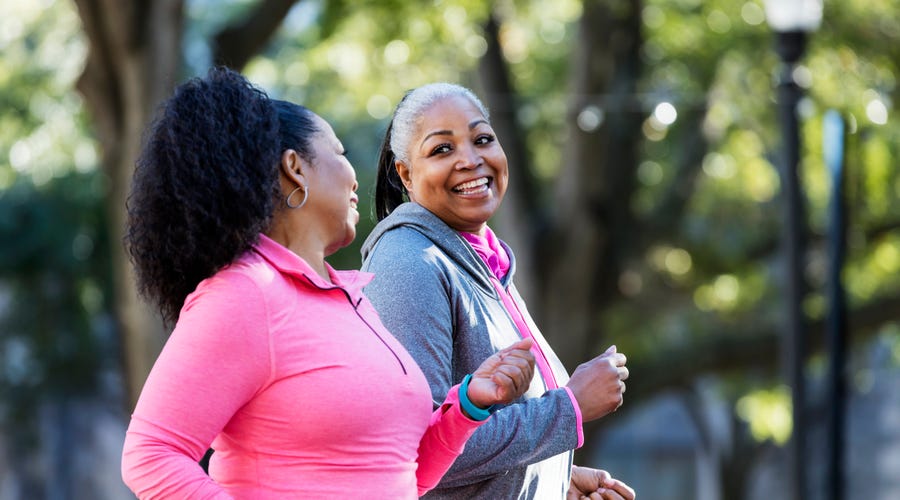
'How are you?' in German: 51 meaningful ways to ask & answer
Author: Marie Schmoll
Once you know how to say hello and how to ask someone their name in German, you’re ready to explore the next important question: “How are you?” in German.
In German-speaking countries, this question will be considered as polite, considerate or awkward. It all depends on the situation - but don’t worry. We’ll teach you the differences.
In America you hear the phrase on every corner, during every social interaction. Your boss, the cashier, and even strangers on the street all seemingly want to know how you are. Except they usually don’t even expect an answer. It’s just a natural addition to saying hello.
Similarly, in German, the common phrase “Wie geht’s?” in combination with a casual tone of voice can also be used as a rhetorical question.
This is especially helpful in the following situations.
- When meeting someone for the first time
- To bridge an awkward silence with someone you don’t know very well
- To start talking to a stranger you want to get to know
In German-speaking countries, where small talk isn’t as popular, this use of the phrase happens a lot less often though. Most of the time “Hi, how are you” in German is used as an honest requiry about your well-being.
So if someone asks “wie geht’s dir?” and seems to wait for a serious answer, it’s your turn to give an honest response. In that case, it’s only polite to go into a little bit of detail on how you actually are.
German-speakers might expect a real answer if they ask “how are you”, especially under these circumstances:
- When catching up with a friend after not talking for while
- When checking up on someone who is going through a difficult time
- In a text to a colleague after they went home sick from the office
Download your free German language essentials eBook here, a trusty guide to all the German basics.
How to say “How are you?” in German
When learning German, you’ll soon ask yourself how to say “how are you” and luckily, the most common way is short and sweet: “Wie geht’s”, pronounced “Vee - gehts (like a prolonged “gets”).
The longer version is “Wie geht es dir?”, which literally translates to “how does it go to you?”
“Wie geht’s” is usually safe to ask anyone - from your best friend to your boss, even at work or a formal event. It’s a rather casual term but it’s still polite. However, depending on how well you know the other person and if they’re an important person, you can resort to more formal expressions.
How are you in German in formal situations
If you want to ask “How are you” in German in a formal context, when you don’t know the other person, you can ask “Wie geht es Ihnen?”.
To be more specific, you can add “Wie geht es Ihnen heute Abend” (How are you tonight) for example or use a number of different variations, depending on the context.

| English | German | IPA | Pronunciation |
| How are you doing? | Wie geht es dir? | [ˌviː ˈɡeːt əs ˌdiːɐ̯] | Vee geht as dear |
| How are you (to a stranger) | Wie geht es Ihnen? | [ˌviː ˈɡeːt əs ˈiːnən] | Vee geht as een-en |
| How are you feeling? | Wie fühlst du dich? | [ˌviː fyːlst duː dɪç] | Vee fülst do dich |
| How are you doing today? | Wie geht es dir heute? | [ˌviː ˈɡeːt əs ˌdiːɐ̯ ˈhɔɪ̯tə] | Vee geht as dear hoiteh |
| How have you been? | Wie ist es dir ergangen? | [ˌviː ɪst əs diːɐ̯ ɛɐ̯ˈɡaŋənən] | Vee isst as dear er-gung-en |
| How is work going? | Wie läuft es auf der Arbeit? | [vi: lɔʏ̯ft ɛs aʊ̯f de:ɐ̯ ˈaʁbaɪ̯t] | Vee loift es ouf der Ar-bite |
| What’s new? | Was gibt es Neues? | [vas gi:pt ɛs ˈnɔʏ̯əs] | Vuss geebt as Noies |
| How are you? (plural) | Wie geht es euch? | [vi: ge:t ɛs ɔʏ̯ç] | Vee geht as oich |
| What have you been up to? (plural) | Was habt ihr so gemacht? | [vas ha:pt i:ɐ̯ zo: ɡəˈmaxt] | Vuss hubt eer zo gehmacht |
How are you in German slang
When you’re talking to a close friend or family member, you can be as casual as you like. In that case, the question is often an honest one and the answer should be more than “fine”. To have a considerate conversation with a German-speaker, you can always ask about their well-being, their family or their job.
The better you know a person the more specific your questions can be. You probably know the names of their partner, pets or kids, so you can ask about those too. If they told you that their grandma had hip surgery or their daughter had her first day of school, you should ask how those events went.
Germans generally appreciate an honest interest in them a lot more than polite small talk.

| English | German | IPA | Pronunciation |
| How are you? | Wie geht’s? | [ˌviː ˈɡeːts] | Vee gehts |
| Hey, how are you? | Na, wie geht’s? | [na vi: ge:ts] | Nuh, vee gehts |
| Are you ok? | Alles ok? | [ˈaləs əʊˈkeɪ] | Ull-les ok |
| How is everything with you? | Wie läuft’s bei dir? | [ˌviː lɔɪ̯fts baɪ̯ ˌdiːɐ̯] | Vee loifts by dear |
| What have you been up to? | Was hast du so gemacht? | [vas hast du: zo: ɡəˈmaxt] | Vuss hust do zo geh-macht |
| Are you alright? | Geht’s dir gut? | [ge:ts di:ɐ̯ gu:t] | Gehts dear goot |
| How is your family? | Wie geht’s deiner Familie? | [vi: ge:ts ˈdaɪ̯nɐ [faˈmiːliə] | Vee gehts die-ner Fuh-me-lee-eh |
| How are your parents? | Wie geht’s deinen Eltern? | [vi: ge:ts ˈdaɪ̯nən ˈɛltɐn] | Vee gehts die-nen El-tarn |
| How are the kids? | Wie geht’s den Kindern? | [vi: ge:ts deːn ˈkɪndɐn] | Vee gehts den Kin-darn |
| How is your dog? | Wie geht’s deinem Hund? | [vi: ge:ts ˈdaɪ̯nəm hʊnt] | Vee gehts die-nem Hoond |
| How is your cat? | Wie geht’s deiner Katze? | [vi: ge:ts ˈdaɪ̯nɐ ˈkatsə] | Vee gehts die-ner cut-tseh |
| Did you sleep well? | Gut geschlafen? | [ɡuːt ɡəˈʃlaːfn̩] | Goot geh-shlah-fen |
| Is everything good? | Alles klar? | [ˈaləs klaːɐ̯] | Ulles clarr |
| Is everything good with you? (singular) | Alles klar bei dir? | [ˈaləs klaːɐ̯ baɪ̯ di:ɐ̯] | Ulles clarr bye dear |
| Is everything good with you? (plural) | Alles klar bei euch? | [ˈaləs klaːɐ̯ baɪ̯ ɔʏ̯ç] | Ulles clarr bye oich |
| How is everything with you? (plural) | Wie läuft’s bei euch? | [vi: lɔʏ̯fts baɪ̯ ɔʏ̯ç] | Vee loifts bye oich |
| What’s up? | Was geht? | [vas ge:t] | Vuss geht |
| What’s up? | Was läuft? | [vas lɔʏ̯ft] | Vuss loift |
| What’s up, buttercup? | Wie geht’s, wie steht’s? | [vi: ge:ts vi: ʃte:ts] | Vee gehts vee shtets |
How to respond to how are you
If you’re still wondering how to respond to “how are you” in German, keep in mind that it depends on the relationship you have with the person asking you. If you have an open and safe relationship with your boss, feel free to give them an honest answer, even if you’re feeling overwhelmed or exhausted for example - or especially then. So you can find a way to solve the issue.

If someone asks you “How are you feeling” in German, (Wie fühlst du dich?), they want an answer. For an in-depth response, head on over to our article on how to express all your emotions in German.
| English | German | IPA | Pronunciation |
| I’m good. How are you? | Mir geht’s gut, und dir? | [mi:ɐ̯ ge:ts gu:t ʊnt di:ɐ̯] | Meer gehts goot, oond dear |
| I’m fine, how are you? | Mir geht’s gut, wie geht’s dir? | [mi:ɐ̯ ge:ts gu:t vi: ge:ts di:ɐ̯] | Meer gehts goot, vee gehts dear |
| I’m feeling great, thanks! | Ich fühle mich großartig, danke! | [ɪç ˈfyːlə mɪç ˈɡʁoːsˌʔaːɐ̯tɪç ˈdaŋkə] | Ich fühle mich gross-artich, dunk-eh |
| We’re good | Uns geht’s gut | [ʊns ge:ts gu:t] | Oons gehts goot |
| Splendid | Bestens | [ˈbɛstn̩s] | Bestens |
| Great | Super | [ˈzuːpɐ] | Zooper |
| Fantastic | Fantastisch | [fanˈtastɪʃ] | Fun-tust-ish |
| Swell | Prima | [ˈpʁiːma] | Preemah |
| So-so | Solala | [ˈzoːˌlaˌla] | Zolala |
| Meh… | Naja… | [ˈnaˈjaː] | Nuh-yah |
| It could be worse | Es könnte schlimmer sein | [ɛs ˈkœntə ˈʃlɪmɐ zaɪ̯n] | As könnte shlim-mah zine |
| Not too bad, thanks, and yourself? | Nicht schlecht, danke, und selbst? | [nɪçt ʃlɛçt ˈdaŋkə ʊnt zɛlpst ] | Nicht shlecht, dunk-eh, oond selbst |
| I’m a little tired, but good thank you! | Ich bin ein bisschen müde, aber gut, danke! | [ɪç bɪn aɪ̯n bɪsçən ˈmyːdə abɐ gu:t ˈdaŋkə] | Ich bin ine biss-chen mü-deh, uh-ber goot, dunk-eh |
| I’ve been better | Mir ging’s schon besser | [mi:ɐ̯ gɪŋs ʃo:n ˈbɛsɐ] | Mere gings shone besser |
| I’m not feeling so great today | Mir geht’s heute nicht so besonders | [mi:ɐ̯ ge:ts ˈhɔɪ̯tə nɪçt zo: bəˈzɔndɐs] | Meer gehts hoit-eh nicht zo be-zon-dares |
| I got up on the wrong side of bed today | Ich bin heute mit dem falschen Fuß aufgestanden | [ɪç bɪn ˈhɔɪ̯tə mɪt de:m ˈfalʃn̩ fu:s ˈaʊ̯fɡəˌʃtandn̩] | Ich bin hoit-eh mit dem fulshen foos ouf-geh-shtun-den |
| I’m miserable | Mir geht’s furchtbar | [mi:ɐ̯ ge:t ɛs ˈfʊʁçtbaːɐ̯] | Meer gehts foorcht-bar |
| Not good | Nicht gut | [nɪçt gu:t] | Nicht goot |
| I’m having a bad day today | Ich habe heute einen schlechten Tag | [ɪç ha:bə ˈhɔɪ̯tə ˈaɪ̯nən ˈʃlɛçtn̩ taːk] | Ich huh-beh hoi-teh ine-nen shlecht-en Tug |
| I’ll be fine | Ich komm’ schon klar | [ɪç kɔm ʃo:n klaɐ̯] | Ich komm shone clarr |
| Can’t complain | Ich kann mich nicht beklagen | [ɪç kan mɪç nɪçt bəˈklaːɡn̩] | Ich cun mich nicht beh-cluh-gehn |
| I’ve never been better | Mir ging es nie besser | [mi:ɐ̯ gɪŋ ɛs ni: ˈbɛsɐ] | Meer ging as knee better |
| It’s a beautiful day today! | Heute ist ein schöner Tag! | [ˈhɔɪ̯tə ɪst aɪ̯n ˈʃøːnɐ ta:k] | Hoit-eh ist ine shön-er tug |
Download our free German essentials eBook
Should you ask a German “how are you”?
Now that you know how to ask a German “how are you”, you better get ready for the answer!
When You Casually Ask a German "How are you?"
The joke goes that Germans take everything so literally that they will give you a detailed, personal account of their well-being if you simply ask them how they are - but of course that’s just a joke.
It’s true that we don’t care for small talk but if there’s one thing we despise even more it’s sharing personal information with strangers.
So in reality, if you ask a complete stranger “how are you” in German, it’s a lot more likely that you will be met with a confused look or maybe even ignored completely. If you mean to say hi, just say hi and nod or smile.
“How are you” is not just a way to say hello like it is in English. Instead, it’s used to start a conversation. So don’t expect your German cashier at the grocery store to ask you how you are and only only ask “wie gehts dir” if you actually want to talk to someone.
Where does the expression “wie geht es dir” come from?
The English question “how are you” is very straightforward. It calls for an adjective to describe your state. You can be good, bad, happy, sad or a million other things, all of which will satisfy the person asking the question.
However, in a number of other languages, including German, the question translates to “How does it go?”, similar to the English “How’s it going?”
- French: Comment tu vas? (How do you go?) or Ça va? (Does it go?)
- Italian: Come va? (How does it go?)
- Dutch: Hoe gaat het? (How does it go?)
The idea behind the question is linked to the notion of life passing by, just like time is passing by. In German, you also say “Zeit vergeht” (time walks past). So when you ask someone how they are in German, you’re basically asking them: “How is time passing by for you” or “how is life progressing for you”?
It’s not just a specific question about the other person’s current state but rather a general inquiry about how their life is going. Maybe that’s why the answers are often more complex in German and other languages!
Keep up with Lebenslauf
There’s a beautiful German word that’s in line with this notion of life walking or running past you: “Der Lebenslauf” (résumé or CV), which translates to “life’s run”. It paints a nice picture of you, going for a jog, plucking different skills and experiences on the way.
If you’re learning German for business, you’ve probably encountered the word already. Maybe you’re even learning German so you can add it to your résumé as a skill?
Well, now you know what “Lebenslauf” means and that the word follows the same logic as the German phrase “Wie geht’s dir?”.
That’s the beauty of learning languages and understanding more and more words. You’ll be able to piece them all together like a puzzle. You’ll start with something as simple as “how are you” but soon you’ll outgrow that stage of your language learning journey, and the more words you collect along the way, the more the language will make sense to you.
Now hop on over to our insightful German language blog and collect some more pieces of the puzzle!



